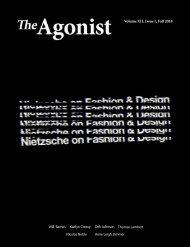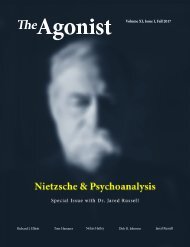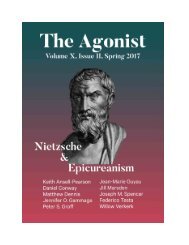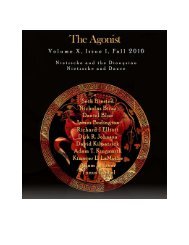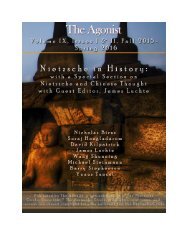Volume XII, Issue II, Spring 2019
You also want an ePaper? Increase the reach of your titles
YUMPU automatically turns print PDFs into web optimized ePapers that Google loves.
THE AGONIST<br />
Europa im Geisterkrieg. Studien zu<br />
Nietzsche—Werner Stegmaier<br />
(Open Book Publishers 2018. Online:<br />
https://www.openbookpublishers.com/product/710)<br />
Michael Steinmann<br />
For those familiar with the German-speaking academic world, Werner<br />
Stegmaier is one of the most eminent Nietzsche scholars. Throughout his many<br />
articles and books, he has developed a unique approach that combines what at<br />
first glance may seem disparate ways of reading Nietzsche. On the one hand,<br />
Stegmaier takes Nietzsche seriously as a philosopher and interprets him in a<br />
“nüchtern”, that is, sober and argument-based way (41, footnote). On the other<br />
hand, he pays crucial attention to the literary and contextual character of<br />
Nietzsche’s work. The results of this approach are as rich in detail as Nietzsche’s<br />
own texts and yet remain able to delineate significant philosophical insights. As a<br />
recent example, Stegmaier has provided an over 600-page long interpretation of<br />
Book Five of Beyond Good and Evil, which undoubtedly sets as a high standard for<br />
all analyses that want to follow the context in which Nietzsche’s thoughts are<br />
articulated. 1<br />
An equally voluminous collection of Stegmaier’s articles is now available in<br />
an online book edited by Andrea C. Bertino: “Europa im Geisterkrieg. Studien zu<br />
Nietzsche” (Open Book Publishers, 2018). The texts gathered in this volume<br />
cover three decades of Stegmaier’s work, ranging from 1985 to 2016. As the editor<br />
rightly points out, from the 21 articles gathered in the volume emerges no less<br />
than an interpretation of Nietzsche’s thought as a whole (V<strong>II</strong>). The collection is<br />
a valuable resource for Nietzsche scholars. It was made possible by an EU-funded<br />
project to create open access monographies.<br />
The title of the collection elides an easy translation. “Europe During the War<br />
of Spirits” may be one way to render it in English. According to Stegmaier, the<br />
title refers to the “dramatic” conditions under which Nietzsche has to be<br />
interpreted (4). Modernity is for Stegmaier a time of “fluctuance” in which all<br />
certainties and all substantial values, especially those values grounded in reason,<br />
1 Stegmaier, Werner. Nietzsches Befeiung der Philosophie. Kontextuelle Interpretation des V. Buchs<br />
der Fröhlichen Wissenschaft. De Gruyter, 2012. See the review by Dirk R. Johnson, The<br />
Agonist, <strong>Volume</strong> IX, <strong>Issue</strong> 1, Fall 2017.<br />
64



